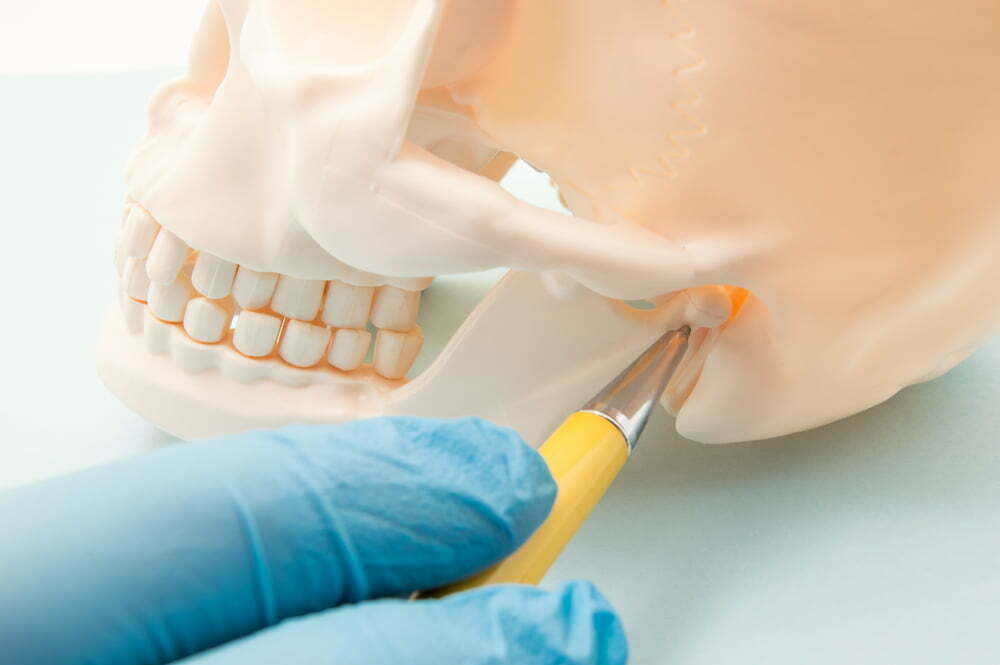TMJ treatment in Winnipeg
Do you ever wake up with a sore jaw? Do you experience headaches or craniofacial pain throughout the day? And when you move your jaw muscles, do you hear a popping sound?
If any of these symptoms apply to you, you could be dealing with temporomandibular joint disorder (also known as TMD or TMJ). This condition can interfere with your ability to eat, speak, and/or smile. For some, it restricts jaw movement and causes severe pain.
Are you concerned that you might be dealing with this disorder? We’re going to take a closer look at what causes this condition and share a few common TMJ treatments:
What Is TMD?
Our jaws are incredibly powerful, as are the muscles that move them. You have two temporomandibular joints, one on either side of your head, which connect your jaw to your skull. If these joints are constantly under pressure, it puts a lot of strain on your teeth and the surrounding tissues.
The cause of TMD is not always clear. A few possibilities include:
- Genetics. If the disorder runs in your family, you are at a higher risk of developing it.
- Stress. Stressful events may cause you to clench your muscles, including your jaws. If this becomes a habit, it can lead to TMJ issues.
Injuries. Damage to the mouth may cause your jaw to become misaligned. This can lead to pain when opening or closing it.


Symptoms of TMD
If you suspect that there’s something wrong with your jaw, there’s a possibility it could be due to a TMJ disorder. Here are a few of the most common symptoms:


Sleep disordered breathing
For some patients, temporomandibular joint disorder is a symptom of another issue: sleep apnea.
Even though sleep apnea is a medical condition, dentists are often the first ones to notice it. Why? Because patients with sleep apnea often grind their teeth at night. They also experience a dry mouth from snoring, which can further damage their teeth.
While obstructive sleep apnea does not necessarily cause TMD (or vice versa), the two conditions interact, and may make a patient’s symptoms worse.
If your Winnipeg dentist suspects that you may have sleep apnea, talk to your doctor. Then, you can work on creating a treatment plan that addresses both the sleep disorder and the TMD.
Damaged teeth
When you grind or clench your teeth, the force of your jaw bone wears down the enamel. Without this protective layer, your teeth are more susceptible to decay, and it’s easier for bacteria to get into them.
Restricted jaw movement
You might be familiar with the feeling of sore muscles after a hard workout. The same thing can happen to the jaw joint of someone with TMD. It may be difficult to move the mouth or open it at all.
After a long night of clenching and grinding the lower jaw, it’s difficult to make the muscles relax. Some patients even experience a locked jaw, where the joint becomes stuck in place. This can make it extremely painful to eat or drink.
Ear & headaches
The most telltale sign of this disorder is persistent pain. You may feel discomfort whenever you move your mouth.
The pain from a TMJ disorder may affect more than your jaw. Some patients experience headaches and pain behind their eyes. You may even notice soreness where your upper and lower jaw connect; this can cause a ringing sound in your ears.
Bruxism (Teeth Clenching & Grinding)
How does your body react to stress? Some people will unconsciously clench or grind their teeth, especially while they’re asleep. If you have bruxism, you may be at a higher risk of having a TMD. Untreated bruxism can make symptoms of TMD worse, or cause it to develop.
Diagnosis and Treatment
To diagnose a TMD, your dentist will examine your mouth, teeth, and jaw joints. They’ll also ask you a series of questions to learn more about your symptoms. A diagnosis is the first step in planning an effective treatment for a TMJ disorder.
While your dentist might be the first one to notice signs of sleep apnea, a proper diagnosis is best left to your doctor. Your doctor may give you a referral to a sleep clinic for further study.
Treatment Options
The goal of TMJ treatment is to reduce suffering, protect the teeth from damage, and offer quality of life improvements for the patient overall.
Unfortunately, there is no “cure” for this disorder, but symptoms can be managed through various treatments that provide pain relief and ease TMJ disorder symptoms.
Simply being aware of the condition can help you manage it. If you catch yourself clenching your jaw, you can make a conscious effort to relax it. Or, if you are dealing with a lot of stress, you can anticipate that your TMD symptoms will get worse and take measures to counteract them.
Here are a few common TMD treatments:
- Relaxation techniques. For many patients, TMD symptoms flare up with stress. Even though many circumstances in our lives are outside of our control, many patients practice stress reduction techniques to ease their minds and symptoms. Examples include massages, therapy, and meditation.
- TMJ pain management. With severe cases of TMD, patients experience jaw joint and neck pain every day. NSAIDs (non-steroidal anti-inflammatory drugs) such as ibuprofen, can reduce swelling and alleviate daily aches and pains. Certain jaw exercises also offer tension relief.
- Dental splint. Oral appliances can prevent teeth grinding and the damage that it causes; they’re one of the most common forms of TMJ treatment.
- Give your jaw muscles a break. Stay away from things like chewing gum, which puts additional strain on your jaw joint. Try to add softer foods to your diet, and avoid ones that are overly crunchy, sticky, or tough.
- Sleep therapy. If you suffer from sleep apnea, treating this condition can also alleviate your TMJ symptoms.
- Oral surgery. When other treatments are ineffective, the jaw may require surgery to be realigned.
Oftentimes, the successful treatment of TMD involves a combination of the above.
Seeking Treatment for TMJ?
Are you tired of waking up with jaw pain? Do you worry about the damage caused by grinding your teeth? At Affinity Dental, we offer TMJ service options designed to alleviate symptoms and restore the function of your jaw. Contact us today to discuss your TMD treatment plan.